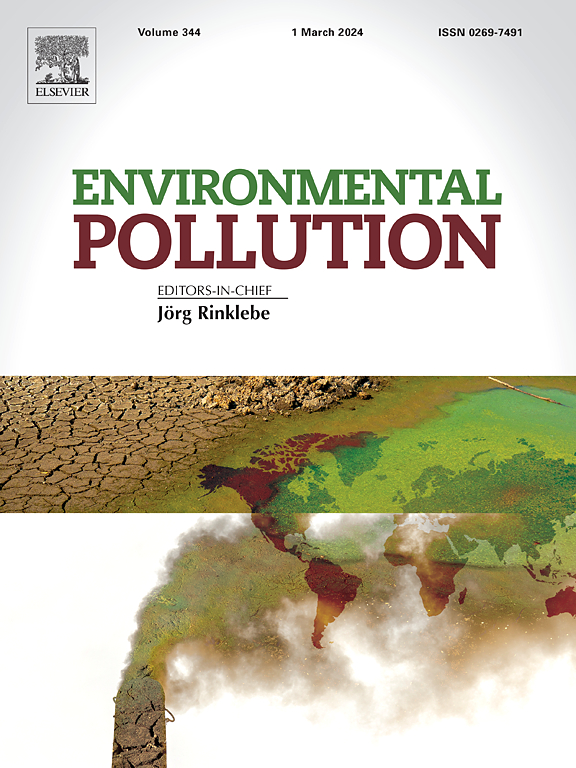突然施用与逐渐施用农药:对土壤细菌和真菌群落的影响
IF 7.3
2区 环境科学与生态学
Q1 ENVIRONMENTAL SCIENCES
引用次数: 0
摘要
农药是一种主要的人为环境输入,也是全球变化的一个因素,给土壤微生物群落带来压力。然而,不同农药施用量对土壤的影响仍然知之甚少。本研究探讨了突然施用与逐渐施用农药对土壤细菌和真菌群落的影响。采用高通量测序技术,研究了10种常用农药对土壤微生物多样性和群落组成的影响。细菌群落在不同处理中表现出最小的变化,而真菌群落对农药暴露反应强烈。逐渐施用降低了优势真菌分类群的相对丰度,导致群落均匀度总体增加。这种效果在两种除草剂和一种三唑杀菌剂中特别明显,它们引起真菌组成的实质性变化。相反,突然施用农药会导致短暂的破坏,但不会促进罕见真菌变体的长期增殖。这些发现表明,长期暴露于农药对真菌施加了强大的选择压力,可能会改变土壤的基本功能,如养分循环和分解。未来的研究应侧重于土壤微生物群落对农药施用的长期反应和长期低剂量暴露的累积效应,以更全面地了解它们如何塑造微生物群落。本文章由计算机程序翻译,如有差异,请以英文原文为准。


Abrupt versus gradual application of pesticides: effects on soil bacterial and fungal communities
Pesticides are a major anthropogenic input to the environment and a factor in global change that puts pressure on soil microbial communities. However, the effects of different rates of pesticide application on soils remain poorly understood. This study investigates how abrupt versus gradual pesticide applications influence soil bacterial and fungal communities. Employing high-throughput sequencing, we examined the microbial diversity and community composition in response to ten commonly used pesticides. Bacterial communities exhibited minimal changes across treatments, whereas fungal communities responded strongly to pesticide exposure. Gradual applications reduced the relative abundance of dominant fungal taxa, resulting in an overall increase in community evenness. This effect was particularly pronounced for two herbicides and a triazole fungicide, which induced substantial shifts in fungal composition. Conversely, abrupt pesticide applications resulted in transient disruptions but did not promote the long-term proliferation of rare fungal variants. These findings suggest that prolonged exposure to pesticides exerts strong selective pressures on fungi, potentially altering fundamental soil functions such as nutrient cycling and decomposition. Future research should focus on the long-term responses of soil microbial communities to pesticide application and the cumulative effects of chronic low-dose exposure to provide a more comprehensive understanding of how they shape microbial communities.
求助全文
通过发布文献求助,成功后即可免费获取论文全文。
去求助
来源期刊

Environmental Pollution
环境科学-环境科学
CiteScore
16.00
自引率
6.70%
发文量
2082
审稿时长
2.9 months
期刊介绍:
Environmental Pollution is an international peer-reviewed journal that publishes high-quality research papers and review articles covering all aspects of environmental pollution and its impacts on ecosystems and human health.
Subject areas include, but are not limited to:
• Sources and occurrences of pollutants that are clearly defined and measured in environmental compartments, food and food-related items, and human bodies;
• Interlinks between contaminant exposure and biological, ecological, and human health effects, including those of climate change;
• Contaminants of emerging concerns (including but not limited to antibiotic resistant microorganisms or genes, microplastics/nanoplastics, electronic wastes, light, and noise) and/or their biological, ecological, or human health effects;
• Laboratory and field studies on the remediation/mitigation of environmental pollution via new techniques and with clear links to biological, ecological, or human health effects;
• Modeling of pollution processes, patterns, or trends that is of clear environmental and/or human health interest;
• New techniques that measure and examine environmental occurrences, transport, behavior, and effects of pollutants within the environment or the laboratory, provided that they can be clearly used to address problems within regional or global environmental compartments.
 求助内容:
求助内容: 应助结果提醒方式:
应助结果提醒方式:


